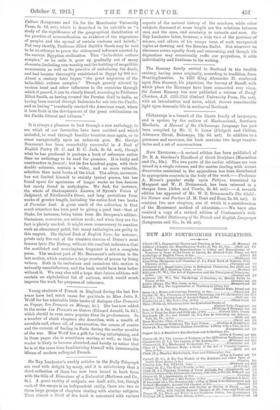It is always a pleasure to look through a new
anthology, to se o which of our favourites have been omitted and which included, to read through familiar beauties once again, or to come unexpectedly upon an unknown gem. Mr. George Beaumont has been remarkably successful in A Book of .Englieh Poetry (T. C. and E. C. Jack, 35. 63. net), though what he has produced is perhaps a book of reference rather than an anthology to be read for pleasure. It is bulky and unattractive in format; but its five hundred pages, with their double columns, contain a wider, and so more valuable, selection than most books of the kind. The editor, moreover, has not limited himself to strictly lyrical poems, but has found space for specimens of longer works no less famous but rarely found in anthologies. We find, for instance, the whole of Shakespeare's Luerece, of Byron's Vision of Judgment, of FitzGerald's Omar, and long quotations from works of greater length, including the entire first two books of Paradise Lost. A great merit of the collection is that much attention has been paid to giving a good text—that of Blake, for instance, being taken from Mr. Sampson's edition. Omissions, moreover, are seldom made, and when they are the fact is plainly marked. It might seem unnecessary to mention such an elementary point, but many anthologies are guilty in this respect. The Oxford Book of English Verse, for instance, prints only five out of the nineteen stanzas oE Donne's most famous lyric The Ecstasy, without the smallest indication that the mutilated and meaningless fragment is not a complete poem. The weakest part of Mr. Beaumont's collection is the last section, which contains a large number of poems by living writers. Both in its inclusions and omissions this section is naturally unsatisfactory, and the book would have been better without it. We may also add a. hope that future editions will contain an alphabetical list of authors, which would much, improve the work for purposes of reference.














































 Previous page
Previous page